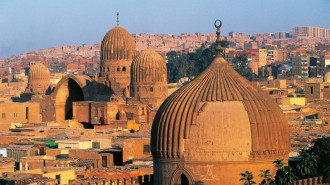
The Flour Massacre: Breaking bread in Gaza has become a matter of life and death

For most people, the word 'flour' has little meaning. It's a staple, we can get it anytime and anywhere. However, in Gaza, it's now a luxury. At the time of writing, a bag of flour costs up to 2500 to 3000 ILS ($700) in the Gaza Strip.
For the past few months, Israel has been starving Gazans to death. Flour is now a matter of survival. Travelling to the south of Gaza — where 1.3 million Gazans shelter — is a deadly shopping trip, and getting flour from an aid truck makes you a live target for the Israeli army.
Israel has bombed Gaza's schools, universities, and hospitals. Essential civilian facilities are active targets in Israel's onslaught, with bakeries the latest casualty.
"More and more stories have emerged of Palestinians making pacts with one another; if one is killed along the way, the others will take flour back to their families. They are known as 'the flour pacts'"
The importance of bread in Gaza
Fresh bread used to be an everyday occurrence in Gaza. Parents used to visit Palestinian bakers to buy khobez ikmaj (pitta bread) for their children's breakfast, stuffing the bread with olive oil and za'atar for a healthy start to the day.
As a treat, Gazans used to buy taboon bread to make the Palestinian delicacy musakhan - a delightful medley of baked chicken, confit onions and sumac. On the weekends, Gazans headed to the bakery for ka'ak al-Quds, stuffed with falafel and hummus. For Palestinians, bread is a way to keep their community alive and their families fed.
Now only 15 bakeries remain in the entire Gaza Strip. People queue for hours for whatever's left. 2.2 million Gazans have lost their lifeline. Starvation and famine loom over the Gaza Strip.
Without flour, how do Gazans bake bread?
Throughout Gaza, the search for flour has begun. The closing of the borders has meant that very little aid has reached Gaza. As a result, the price of flour has skyrocketed.
More than half of Gazans have no source of income and therefore rely on whatever little aid is coming in to feed their families. Animal feed has become the main substitute. Reminder: animal feed is not made for human use, but for desperate Gazans, it's all they have.
As a last resort, many have made the treacherous journey from the north of Gaza to the south in search of flour. Some never return, their corpses decaying on the road to find sustenance.
More and more stories have emerged of Palestinians making pacts with each other; if one is killed along the way, the others will take flour back to their families. They are known as 'the flour pacts'.
|
With no electricity and little access to gas, Palestinians in Gaza lucky enough to find flour have resorted to baking bread with fire. Some make primitive ovens made from mud, straw, sticks, and cement. Others use empty gas tanks or metal trays as saj.
Firewood is few and far between. Bags of small pieces of wood are a luxury, most Gazans gather their own wood or, in many cases, burn their school books and work documents. Daily survival has long exceeded the hopes and dreams of the future, but let us not forget the conditions that have meant children are forced to choose between books and bread.
Remembering the victims of the Flour Massacre
February 29 2024 was meant to be a day of hope for Palestinians in the north of Gaza. They heard news of aid trucks coming to deliver precious flour. They had already survived by the skin of their teeth, but with some flour, they might have had another chance to live a little longer.
In their hundreds, the hungry walked towards the aid trucks. Their only crime was that they wanted to sleep a few nights without being awakened by the sounds of bombs or the grumbling of their stomachs. Yet upon reaching the aid convoy, they were mercilessly shot.
For Israel, fighting famine is a crime, wanting to survive is a crime. As the Israeli tanks crushed the desperate Palestinians, flour became mixed with blood. At least 112 Palestinians were killed. Over 700 hungry Palestinians were injured.
Next time you break your fast or simply eat a piece of bread, remember the victims of the Flour Massacre, those who sacrificed their lives to make sure their families were fed and dreamt of keeping Palestine alive.
Lama Obeid is a Palestinian writer and trainer based in Ramallah, Palestine. She writes about culture, gastronomy, politics, and travel. She advocates for the Palestinian cause wherever she goes and is a third generation Palestinian refugee displaced from the town of Ein Karem in West Jerusalem.
Follow her on X: @Lama_writes4u
![Widespread famine is imminent in Gaza [Getty Images]](/sites/default/files/styles/medium_16_9/public/2024-03/GettyImages-2015647000.jpg?h=199d8c1f&itok=K5rYF3Iy)
![Palestinians mourned the victims of an Israeli strike on Deir al-Balah [Getty]](/sites/default/files/styles/image_684x385/public/2024-11/GettyImages-2182362043.jpg?h=199d8c1f&itok=xSHZFbmc)


![The law could be enforced against teachers without prior notice [Getty]](/sites/default/files/styles/image_684x385/public/2178740715.jpeg?h=a5f2f23a&itok=hnqrCS4x)
 Follow the Middle East's top stories in English at The New Arab on Google News
Follow the Middle East's top stories in English at The New Arab on Google News


